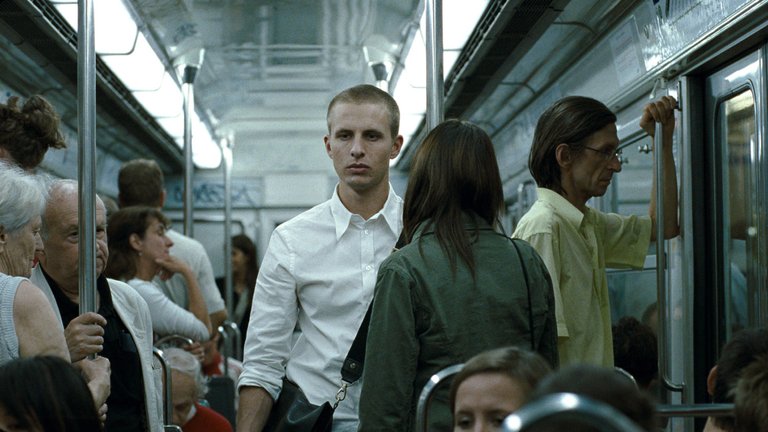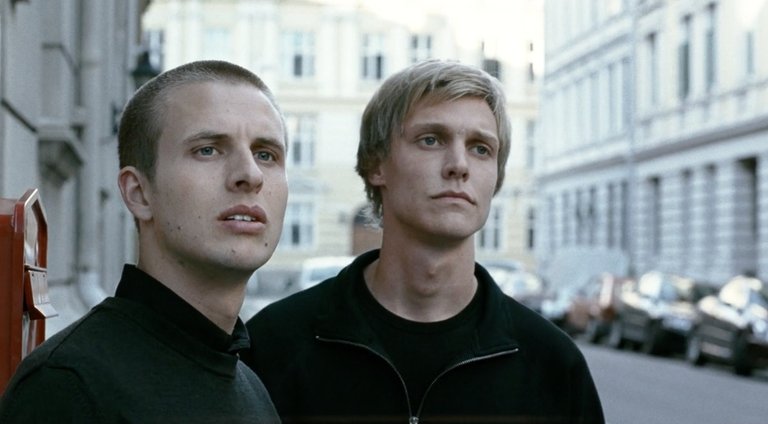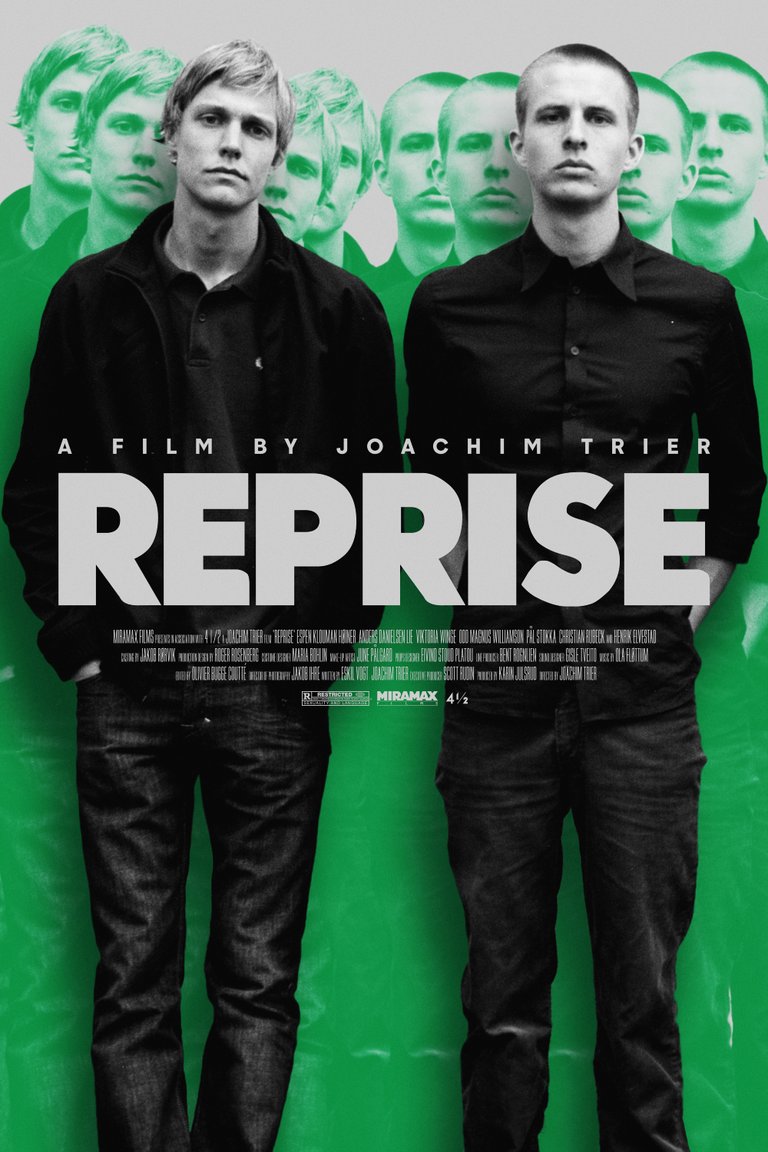Reprise (2006): friendship and literature | amistad y literatura

Joachim Trier is a Norwegian film director in his fifties who's not only responsible for some films that have been on my to-watch list for a long time (like Thelma and Oslo, 31. August) but also wrote and directed one of my favorite films of recent years, Verdens verste menneskeaka translated as The Worst Person in the World (if you haven't seen it yet, I highly recommend it). Since I hadn't seen anything of his for a while, I decided to take advantage of the fact that MUBI has Reprise available and I visited Northern Europe again.
Joachim Trier es un director de cine noruego de casi cincuenta años que no sólo es responsable de algunas películas que están en mi lista de pendientes hace tiempo (como Thelma y Oslo, 31. August) sino que también escribió y dirigió una de mis películas favoritas de los últimos años, Verdens verste menneskeaka traducida como La peor persona del mundo (si aún no la han visto, se las recomiendo ampliamente). Como tenía tiempo sin ver algo suyo decidí aprovechar que MUBI tiene disponible Reprise y volví a visitar al Norte de Europa.
This drama about friendship and Literature begins with Erik and Phillip, two young Norwegians in their early twenties trying to get ahead as writers. They write, correct their writings and send them to publishers. I really liked that the story began with the two of them next to a mailbox about to send their respective manuscripts and the imaginative exercise that the narrator does when he tells us what could have been the fate of each one. The tone of this daydream is lively, positive and convincing. However, those same features and the verb tense in which it is conjugated clearly indicate to us that things didn't turn out that way. Back to reality, Erik's manuscript is rejected, but Phillip's is accepted and in a few months, that same fall, he and his book manage to penetrate the current Norwegian literature scene, appear on television, fill bookstores and become almost a phenomenon in the media. The opposite of their literary destinies, the failure of one and the success of the other, doesn't pose a big problem for their friendship (although yes, perhaps we can think that there's some jealousy) but we cannot dwell on that too much because shortly after the the sudden success of Phillip's novel, the film throws us into the future, six months after the opening sequence. Erik goes with some friends to a psychiatric hospital to pick up a friend who has undergone treatment: Phillip. The viewers look at each other and ask what happened? How did Phillip get there?
Este drama sobre la amistad y la Literatura comienza con Erik y Phillip, dos jóvenes noruegos de veintipocos años que intentan salir adelante como escritores. Escriben, corrigen sus escritos y los envían a las editoriales. Me gustó mucho que la historia comenzara con ellos dos junto a un buzón a punto enviar sus respectivos manuscritos y el ejercicio imaginativo que hace el narrador cuando nos cuenta lo que hubiera podido ser el destino de cada uno. El tono de esta ensoñación es animado, positivo y convincente. Sin embargo, esos mismos rasgos y el tiempo verbal en el que es conjugado nos indican claramente que las cosas no salieron así. De vuelta a la realidad, el manuscrito de Erik es rechazado, pero el de Phillip es aceptado y en pocos meses, en ese mismo otoño, él y su libro logran penetrar la escena de la literatura noruega actual, aparecer en televisión, abarrotar las librerías y convertirse casi en un fenómeno del medio. Lo opuesto de sus destinos literarios, el fracaso de uno y el éxito del otro, no supone un gran problema para su amistad (aunque sí, quizás podamos pensar que hay algo de celos) pero no podemos entretenernos mucho en eso porque poco tiempo después del repentino éxito de la novela de Phillip, la película nos arroja al futuro, seis meses después de la secuencia inicial. Erik va con unos amigos a un hospital psiquiátrico a recoger a un amigo que se ha sometido a un tratamiento: Phillip. Los espectadores nos miramos y preguntamos ¿qué ocurrió? ¿cómo ha llegado Phillip ahí?

Little by little and through a non-linear narrative that is fed by memories of both friends, we learn what led Phillip to his collapse and where each of the protagonists is now. Erik, trying to encourage his friend, insists that he start writing (he himself is still trying to get a publisher to publish it), but writing again is the last thing Phillip wants in those moments when he just wants to take back his life back... and his beloved.
Poco a poco y a través de una narración no lineal que se alimenta de recuerdos de ambos amigos, nos vamos enterando de lo que llevó a Phillip a su colapso y del lugar en que cada uno de los protagonistas se encuentra ahora. Erik, intentando animar a su amigo, le insiste en que se ponga a escribir (él mismo sigue intentando que alguna editorial lo publique), pero volver a escribir es lo último que Phillip desea en esos momentos en que sólo quiere recuperar su vida... y a su amada.
Reprise, in Norwegian, means repetition. Hence, the center of the plot is Phillip's attempts to - with the exception of writing - return to having the life he had before his collapse, which is why he does some things again, visits certain places again and the memories come back mixed with his desires, but to what extent is this a genuine desire of his heart and to what extent is it an idea devoid of emotion, of meaning? As we think about that, we get to know Erik better, his motivations, his struggle to write, his girlfriend, and we - through the voice of that omniscient, energetic and sincere narrator - discover what unites the two of them, Phillip and Erik, to the other members of their group, Lars, Henning, Morten, Geir and the others. On that side, Reprise is also the portrait of male friendship (perhaps too masculine) as the director saw Norwegian society at the time. Some viewers can understand the reason for certain actions and why these young people behave the way they do and say the things they say, but I think that some sectors of modern society could be uncomfortable with some of the ideas put forward by them. However, we must not forget that this is a work of fiction limited to a specific space and time, so it's better not to take things too personally.
Reprise, en noruego, significa repetición. De allí que el centro de la trama sean los intentos de Phillip de - a excepción de la escritura - volver a tener la vida que tenía antes de su colapso, por eso vuelve a hacer algunas cosas, visita de nuevo ciertos lugares y los recuerdos se mezclan con sus anhelos, pero ¿hasta qué punto ese trata de un deseo genuino de su corazón y hasta qué punto es una idea carente de emoción, de significado? A la par que vamos pensando en eso vamos conociendo mejor a Erik, sus motivaciones, su lucha por escribir, su novia, y vamos - a través de la voz de ese narrador omnisciente, enérgico y sincero - descubriendo qué los une a ellos dos, Phillip y Erik, a los otros miembros de su grupo, Lars, Henning, Morten, Geir y los demás. Por ese lado, Reprise es también el retrato de la amistad masculina (tal vez demasiado masculina) tal como veía el director a la sociedad noruega del momento. Algunos espectadores podemos entender el por qué de ciertas acciones y por qué esos jóvenes se comportan como se comportan y dicen las cosas que dicen, pero creo que algunos sectores de la sociedad moderna podrían incomodarse con algunas de las ideas expuestas por ellos. Sin embargo, no hay que olvidar que se trata de una obra de ficción circunscrita a un espacio y a un tiempo específico, así que es mejor no tomarse las cosas muy a pecho.

With honest performances, very well done, good cinematography and a script that mixes drama and tension with some laughter and the interventions of a voice-over that in the case of this film works very well, Trier has left us in Reprise an ode to friendship, dreams and literature. On this last point, although it's true that the film begins with the literary dream of these two friends, the truth is that beyond their favorite author and the title of some books, I didn't feel that they were truly committed to a literary vocation or that the film elevated the figure of the writer. Perhaps it's due to a cultural distance that prevents me from understanding or interpreting the two young Norwegians, but I think of relationships such as the friendship between Javier Cercas and Roberto Bolaño or between the latter and A. G. Porta; or going a little further back to the relationships between the members of the Latin American Boom, Cortázar, García Máquez, Donoso, Vargas Llosa, Carlos Fuentes, and I feel that in all of these there was a vocation, a commitment to a life around the word in which the rest was subordinated to the writing of their fictions. And that intensity, that commitment, I didn't feel it in Erik or Phillip. Leaving that aside, Reprise is a good medium-length film (105 minutes) that is different from what you normally see on mainstream streaming platforms and that alone makes it worth watching, although, above this one, I recommend The Worst Person In the World by the same director. Do any of you know the work of Joachim Trier? Which of his movies have you seen? I read you in the comments.
Con actuaciones honestas, muy bien hechas, buena cinematografía y un guión que mezcla drama y tensión con algunas risas y las intervenciones de una voz en off que en el caso de esta cinta funciona muy bien, Trier nos ha legado en Reprise una oda a la amistad, a los sueños y a la literatura. Sobre este último punto, si bien es cierto que la cinta inicia con el sueño literario de estos dos amigos, la verdad es que más allá de su autor favorito y el título de algunos libros, no sentí que estuvieran verdareramente comprometidos con una vocación literaria o que la película elevase la figura del escritor. Quizás se deba a una distancia cultural que me impide comprender o interpretar a los dos jóvenes noruegos, pero pienso en relaciones como la amistad entre Javier Cercas y Roberto Bolaño o entre este último y A. G. Porta; o yendo un poco más atrás a las relaciones entre los miembros del Boom latinoamericano, Cortázar, García Máquez, Donoso, Vargas Llosa, Carlos Fuentes, y siento que en todos estos había una vocación, un compromiso con una vida en torno a la palabra en la que lo demás quedaba supeditado a la escritura de sus ficciones. Y esa intensidad, ese compromiso, no lo sentí ni en Erik ni en Phillip. Dejando eso de lado, Reprise es una buena película de duración media (105 minutos) que es diferente a lo que normalmente se ve en las plataformas de streaming corrientes y ya eso hace que valga la pena verla, aunque les recomiendo, por encima de esta, The Worst Person In the World del mismo director, ¿alguno de ustedes conoce la obra de Joachim Trier? ¿cuál de sus películas han visto? Los leo en los comentarios.
Reviewed by | Reseñado por @cristiancaicedo
Other posts that may interest you | Otros posts que pueden interesarte:
  |
|---|



Puedo inferir algo sobre la buena amistad y la motivación además de la empatía. Que buen film, me gustó tu reseña. De las últimas que mencionas no conozco ninguna. Saludos 🤗 Gracias por compartir.